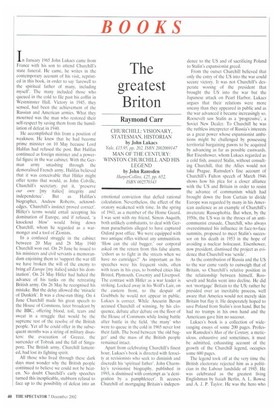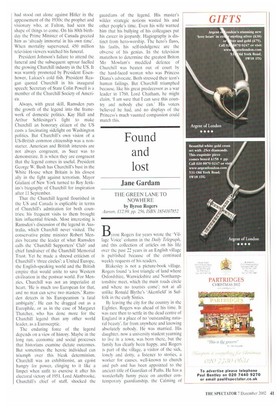The greatest Briton
Raymond Carr
CHURCHILL: VISIONARY, STATESMAN. HISTORIAN by John Lukacs Yale, £15. 95, pp. 202, ISBN 2002069147 MAN OF THE CENTURY: WINSTON CHURCHILL AND HIS LEGEND by John Ramsden HarperCollins, £25, pp. 652, ISBN 002570343 In January 1965 John Lukacs came from France with his son to attend Churchill's state funeral. He came, he writes in the contemporary account of his visit, reprinted in this book, in order to say 'farewell to the spiritual father of many, including myself. The many included those who queued in the cold to file past his coffin in Westminster Hall. Victory in 1945, they sensed, had been the achievement of the Russian and American armies. What they mourned was the man who restored their self-respect by saving them from the humiliation of defeat in 1940.
He accomplished this from a position of weakness. He knew that he had become prime minister on 10 May because Lord Halifax had refused the post. But Halifax continued as foreign minister and a powerful figure in the war cabinet. With the German army smashing through the demoralised French army, Halifax believed that it was conceivable that Hitler might offer terms that would, as John Colville, Churchill's secretary, put it, 'preserve our own [my italics] integrity and independence'. But as Halifax's biographer, Andrew Roberts, acknowledges, 'Churchill's instinct proved correct'. Hitler's terms would entail accepting his domination of Europe, and if refused, 'a knockout blow' would bring down Churchill, whom he regarded as a warmonger and a tool of Zionists.
In a confused struggle in the cabinet between 20 May and 28 May 1940 Churchill won out. On 29 June he issued to his ministers and civil servants a memorandum enjoining them to 'support the war till we have broken the will of the enemy to bring all Europe [my italics] under his domination'. On 24 May Hitler had halted the advance of his tanks on the retreating British army. On 26 May he recognised his mistake. But the delay allowed the 'miracle of Dunkirk'. It was a close-run thing. On 4 June Churchill made his great speech to the House of Commons, later broadcast by the BBC, offering blood, toil, tears and sweat in a struggle that would be the supreme test of the resolve of the British people. Yet all he could offer in the subsequent months was a string of military disasters: the evacuation of Greece, the surrender of Tobruk and the fall of Singapore. The British army, Churchill lamented, had lost its fighting spirit.
All those who lived through these dark days must wonder why the British people continued to believe we could not be beaten. No doubt Churchill's early speeches turned this inexplicable, stubborn refusal to face up to the possibility of defeat into an emotional conviction that defied rational calculation. Nevertheless, the effect of the oratory weakened with time. In the spring of 1941, as a member of the Home Guard, I was sent with my friend, Simon Asquith, both unlikely combatants, to deal with German parachutists alleged to have captured Oxford post office. We were equipped with two antique rifles without any ammunition. 'How can the old bugger.' our corporal asked on the return from this false alarm, 'exhort us to fight in the streets when we have no cartridges?' As important as his speeches were his frequent visits, often with tears in his eyes, to bombed cities like Bristol, Plymouth. Coventry and Liverpool. The contrast with Hitler as a war leader is striking. Locked away in his Wolf's Lair, on the eastern front, to the despair of Goebbels he would not appear in public. Lukacs is correct. While Aneurin Bevan accused Churchill of winning, by his eloquence, debate after debate on the floor of the House of Commons while losing battle after battle in the field, 'the many' who were to queue in the cold in 1965 never lost their faith. The bond between 'the old bugger' and the mass of the British people remained intact.
Apart from celebrating Churchill's finest hour, Lukacs's book is directed with ferocity at revisionists who seek to diminish and discredit his 'spiritual father'. John Charmley's revisionist biography, published in 1993, is dismissed with contempt as 'a denigration by a pamphleteer'. It accuses Churchill of mortgaging Britain's indepen dence to the US and of sacrificing Poland to Stalin's expansionist greed.
From the outset Churchill believed that only the entry of the US into the war could secure victory. It was not Churchill's desperate wooing of the president that brought the US into the war but the Japanese attack on Pearl Harbor. Lukacs argues that their relations were more uneasy than they appeared in public and as the war advanced it became increasingly so. Roosevelt saw Stalin as a 'progressive', a Soviet New Dealer. To Churchill he was the ruthless interpreter of Russia's interests as a great power whose expansionist ambitions might be challenged by possessing territorial bargaining pawns to be acquired by advancing as far as possible eastwards. But Eisenhower, whom Lukacs regarded as a cold fish, assured Stalin, without consulting Churchill, that the Allies would not take Prague. Ramsden's fine account of Churchill's Fulton speech of March 1946 shows how his plea for a closer alliance with the US and Britain in order to resist the advance of communism which had brought down the Iron Curtain to divide Europe was regarded by many in his American audience as an example of Churchill's inveterate Russophobia. But when, by the 1950s, the US was in the throes of an anticommunist crusade, Churchill, who always overestimated his influence in face-to-face summits, proposed to meet Stalin's successor on his death in 1953 in the hope of avoiding a nuclear holocaust. Eisenhower, now president, dismissed the project as evidence that Churchill was 'senile'.
As the contribution of Russia and the US to the war came vastly to outweigh that of Britain, so Churchill's relative position in the relationship between himself. Roosevelt and Stalin went into decline. He did not 'mortgage' Britain to the US; rather he presided over an inevitable process, well aware that America would not merely skin Britain but flay it. He desperately hoped to save Poland from Stalin's iron hand. But he had no trumps in his own hand and the Americans gave him no succour.
Lukacs's book is a collection of wideranging essays of some 200 pages. Professor Ramsden's Man of the Century, a meticulous, exhaustive and sometimes, it must be admitted, exhausting account of the growth of the Churchill legend, occupies some 600 pages.
The legend took off at the very time the British electorate rejected him as a politician in the Labour landslide of 1945. He was celebrated as the greatest living Englishman by Isaiah Berlin, A. L. Rowse and A. J. P. Taylor. He was the hero who
had stood out alone against Hitler in the appeasement of the 1930s; the prophet and visionary who, at Fulton, had seen the shape of things to come. On his 80th birthday the Prime Minister of Canada greeted him as 'already immortal in his own time'. When mortality supervened, 450 million television viewers watched his funeral.
President Johnson's failure to attend the funeral and the subsequent uproar fuelled the growing Churchill industry in the US. It was warmly promoted by President Eisenhower, Lukacs's cold fish. President Reagan quoted Churchill in his inaugural speech; Secretary of State Cohn Powell is a member of the Churchill Society of America.
Always, with great skill, Ramsden puts the growth of the legend into the frame work of domestic politics. Kay Hall and Arthur Schlesinger's fight to make Churchill an honorary citizen of the US casts a fascinating sidelight on Washington politics. But Churchill's own vision of a US-British common citizenship was a non starter. American and British interests are not always congruent, as Suez was to demonstrate. It is when they are congruent that the legend comes in useful. President George W. Bush has Churchill's bust in the White House when Britain is his closest ally in the fight against terrorism. Mayor Giuliani of New York turned to Roy Jenkins's biography of Churchill for inspiration after 11 September.
That the Churchill legend flourished in the CS and Canada is explicable in terms of Churchill's admiration for both coun tries; his frequent visits to them brought him influential friends. Most interesting is Ramsden's discussion of the legend in Aus tralia, which Churchill never visited. The conservative prime minister Robert Men zies became the leader of what Ram sden calls the 'Churchill Supporters' Club' and chief fundraiser of the Churchill Memorial Trust. Yet he made a shrewd criticism of Churchill's 'three circles': a United Europe, the English-speaking world and the British empire that would unite to save Western civilisation in the postwar world. For Menzies, Churchill was not an imperialist at heart. 'He is much too European for that, and no man can serve two masters.' Ramsden detects in his Europeanism 'a fatal ambiguity'. He can be dragged out as a Europhile, or as in the case of Margaret Thatcher, who has done more for the Churchill legend than any other world leader, as a Eurosceptic.
The enduring force of the legend depends on a view of history. Maybe in the long run, economic and social processes that historians examine dictate outcomes. But sometimes the heroic individual can triumph over this bleak determinism.
Churchill was an exhibitionist, an egoist hungry for power, clinging to it like a limpet when unfit to exercise it after his electoral victory of 1951. Lord Alanbrooke, Churchill's chief of staff, shocked the guardians of the legend. His master's wilder strategic notions wasted his and other people's time. Even his wife warned him that his bullying of his colleagues put his career in jeopardy. Hagiography is distinct from hero-worship. The hero's flaws, his faults, his self-indulgence are the obverse of his genius. In the television marathon to determine the greatest Briton Mo Mowlam's muddled defence of Churchill was beaten out of court by the hard-faced woman who was Princess Diana's advocate. Both stressed their icon's human failings. But Churchill triumphed because, like his great predecessor as a war leader in 1750, Lord Chatham, he might claim, I am sure that I can save this country and nobody else can.' His voters believed he had, and no displays of the Princess's much vaunted compassion could match this.











































































 Previous page
Previous page